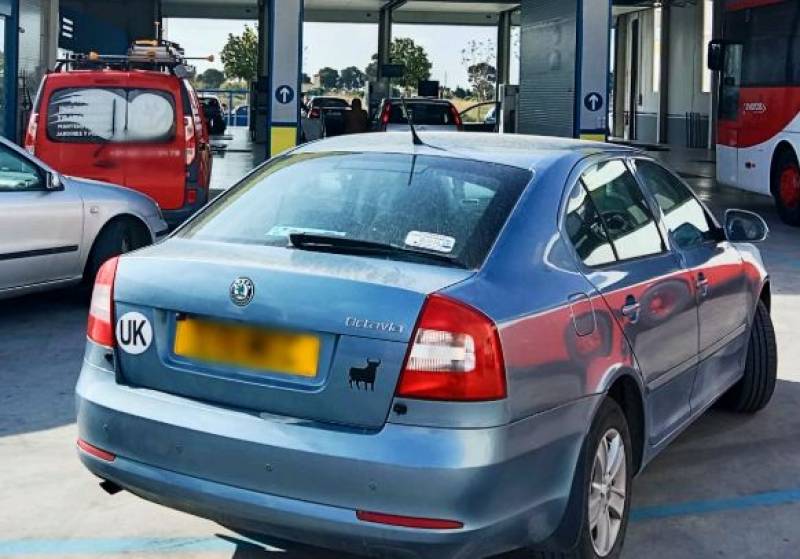- Region
- Vega baja
- Marina Alta
- Marina Baixa
- Alicante
- Baix Vinalopo
- Alto & Mitja Vinalopo
-
ALL TOWNS
- ALICANTE TOWNS
- Albatera
- Alfaz Del Pi
- Alicante City
- Alcoy
- Almoradi
- Benitatxell
- Bigastro
- Benferri
- Benidorm
- Calosa de Segura
- Calpe
- Catral
- Costa Blanca
- Cox
- Daya Vieja
- Denia
- Elche
- Elda
- Granja de Rocamora
- Guardamar del Segura
- Jacarilla
- Los Montesinos
- Orihuela
- Pedreguer
- Pilar de Horadada
- Playa Flamenca
- Quesada
- Rafal
- Redovan
- Rojales
- San Isidro
- Torrevieja
- Comunidad Valenciana
article_detail
Date Published: 07/11/2025
Own property in Spain? Here's what's changing for non-residents in 2025-2026
We’re just a couple of months away from the new year, and there are important things that all homeowners should now for 2026...

As Spain heads into a new tax year, several legal updates are set to impact non-resident property owners from 2025 onwards. While core tax rates remain stable, evolving EU rulings and national reforms could change how non-resident taxation works, especially for property owners outside the EU.
If you own property in Spain but live abroad, staying compliant can feel complex. Digital solutions like IberianTax now make it easy for non-resident property owners to manage their Spanish tax obligations fully online; easy, secure and 100% compliant with the Spanish Tax Office.
Non-resident Property Tax essentials for 2025
Here’s what every non-resident property owner should know for the upcoming tax deadlines:
- Imputed Income Tax (Modelo 210): Required if your property is vacant or operational only for personal use.
Deadline: 31 December 2025 (for the 2024 tax year).
- Rental Income Tax (Modelo 210): Applies to short- and long-term rentals.
Deadline: 1-20 January 2026 (for the 2025 tax year).
- Capital Gains Tax (Modelo 210): Due within four months after selling a property.
You can file all these tax returns online through IberianTax, Spain’s digital platform for non-resident property owners. All you’ll need is your Spanish tax number (NIE/NIF) and basic property details (e.g., cadastral reference / IBI receipt).
While it’s not required when filing with IberianTax, having a Certificado Digital (electronic ID) can be very useful for non-resident owners. It lets you access official property information, check local tax bills, and receive electronic notifications from the Spanish Tax Office from abroad.
If you don’t have one yet, IberianTax also offers a simple online service to help you obtain your digital certificate quickly, securely and with multilingual assistance throughout the process.
What’s new for 2025: Legal updates you can’t afford to miss
1. Local changes to imputed income rates
While national tax rates remain at 24% for non-EU residents and 19% for EU/EEA residents, the imputed income percentage used to calculate the taxable base varies based on the property’s cadastral revision date.
A 1.1% rate applies if the property’s cadastral value was updated within the last ten years through a general collective valuation; otherwise, a 2% rate applies.
This means that in some areas, where new valuations have recently taken place, the applicable rate may change from 2% to 1.1%, or vice versa, affecting the final tax due.
IberianTax constantly monitors local and national changes to ensure every client filing is accurate and compliant. Stay informed via our blog and social media channels.
2. Mandatory Rental Registration Number (NRA)
From 1 July 2025, Spain introduced a Single Rental Registry, requiring all short-term rental properties to obtain an NRA, even if they already hold a tourist licence. Major rental platforms will automatically remove unregistered listings.
The aim is to improve transparency and prevent fraud in the rental market. To stay compliant, make sure you register early, IberianTax can help you obtain your NRA fully online in just minutes, avoiding fines or listing removals.
3. Could non-EU owners soon claim deductible rental expenses?

In July 2025, Spain’s Audiencia Nacional (National Court) ruled that denying non-EU property owners the right to deduct rental-related expenses may violate EU non-discrimination laws (Article 63 TFEU).
Though still under appeal, this ruling could allow non-EU landlords to claim expenses such as:
- Maintenance and cleaning
- Utilities and insurance
- Property management fees
- Repairs and local taxes
If confirmed, owners may also request retroactive refunds, provided they have proper receipts and invoices.
To safeguard your rights in advance, IberianTax can help you initiate a preliminary procedure to interrupt the prescription period for 2021, ensuring you don’t lose the opportunity to claim a refund if the ruling is confirmed.
Pro Tip: Start keeping all rental expense records to prepare for possible claims.IberianTax’s free Expenses Tracker helps you log and manage deductible costs, automatically syncing them with your Modelo 210 returns. Register for free today and start using this smart tool.
4. EU Commission challenges Spain’s non-resident tax rules
In June 2025, the European Commission launched infringement proceedings against Spain over the way non-resident property owners are taxed.
The case focuses on the imputed income tax, a notional tax applied to properties that sit vacant or are used for personal purposes. Under the current system, non-residents must pay this annual tax on their Spanish property, while Spanish tax residents are exempt on their main home, but must pay this on second or additional properties.
The Commission argues that this distinction may restrict the free movement of capital and workers (Articles 45 and 63 TFEU; Articles 28 and 40 EEA), potentially creating indirect discrimination against non-resident owners. However, it is not yet clear whether the rule will ultimately be considered discriminatory, since similar taxation applies to Spanish residents who own more than one property.
Spain has two months to respond before the case could go to the Court of Justice of the EU, risking financial penalties if found in breach of EU law.
For now, current rules remain unchanged, and non-resident owners must still file Modelo 210 for their 2024 imputed income tax by 31 December 2025.
Stay compliant, stay informed
Big changes are on the horizon for non-resident property taxation in Spain, from new rental registration requirements to possible updates on deductible expenses. Staying informed isn’t just smart; it’s essential to ensure every filing is accurate and fully compliant with the latest regulations.
IberianTax simplifies this process for non-resident property owners by offering a secure, fully online platform designed to handle all Spanish property tax returns – including Imputed Income, Rental Income, and Capital Gains Tax. The platform also provides multilingual assistance, free tax calculators, expense tracking tools, and regular updates on tax developments that may affect foreign owners.
Whether you’re managing one property or several, our expert guidance and automated email reminders ensure you never miss a tax deadline. Wherever you are in the world, IberianTax keeps your Spanish non-resident property taxes (Modelo 210) under control.
Learn more at www.iberiantax.com and enjoy 5% off your first tax filing with the code WELCOME5
staff.inc.ali
Loading
If you own property in Spain but don’t live there, you must pay tax – whether you use it as a holiday home, rent it out or sell it.
IberianTax helps non-resident property owners file their Modelo 210 tax forms quickly and securely. Our easy-to-use online platform simplifies the process of filing the Modelo 210 tax form, ensuring full compliance with Spanish tax laws. With step-by-step support and affordable pricing starting at just €34.95, filing your taxes has never been easier or stress-free.
Join thousands of non-resident homeowners who have chosen IberianTax as their trusted tax partner in Spain. Visit our website and sign up for your free account now.

What is the Modelo 210 tax form?
The Modelo 210 is Spain’s tax form for non-residents who own property in Spain. It is used to declare taxes related to your property.
There are different types, depending on the tax:
- Imputed Income (Modelo 210): Owning a property for personal use (i.e.: holiday home).
- Rental Income (Modelo 210): For income earned from renting out your property.
- Capital Gains (Modelo 210): For tax due when you sell your property.
How to file your non-resident Modelo 210 tax with IberianTax in 3 steps
- Create an Account: Sign up for free to start. You can get a free tax estimate by using our tax calculator and only pay when you submit your Modelo 210.
- Enter Your Details: Complete the simple IberianTax questionnaire with your property and personal information. Step-by-step guidance and examples are included.
- Submit Your Tax: Choose your payment method, and IberianTax will file your Spanish non-resident tax return online for you. Simple!
Why use IberianTax to file your Modelo 210?

- Fast & Easy: File your Modelo 210 online in minutes.
- Simple: Step-by-step questionnaire – no tax knowledge needed.
- Affordable: Services from €34.95 VAT inc., far less than typical €150+VAT.
- Flexible: File anytime, anywhere, with multiple payment options.
- Accurate: Built by tax experts with automatic checks.
- Secure: Data encryption and safe online payments.
- Certified: Approved by the Spanish tax authorities.
- Multilingual: English, French and German support available.
Whether you need to file taxes for personal use, rental income, or capital gains, IberianTax offers a comprehensive, reliable, and cost-effective solution for non-resident property owners in Spain.
Get started now on the IberianTax website and enjoy a 10% discount or, if you have any further questions, the team will be happy to answer them. Just use the contact box above, or fill in the contact form on their website.
Alternatively, you can send an email to contact@iberiantax.com and they will get back to you as soon as possible.
Contact Murcia Today: Editorial 000 000 000 /
Office 000 000 000
































